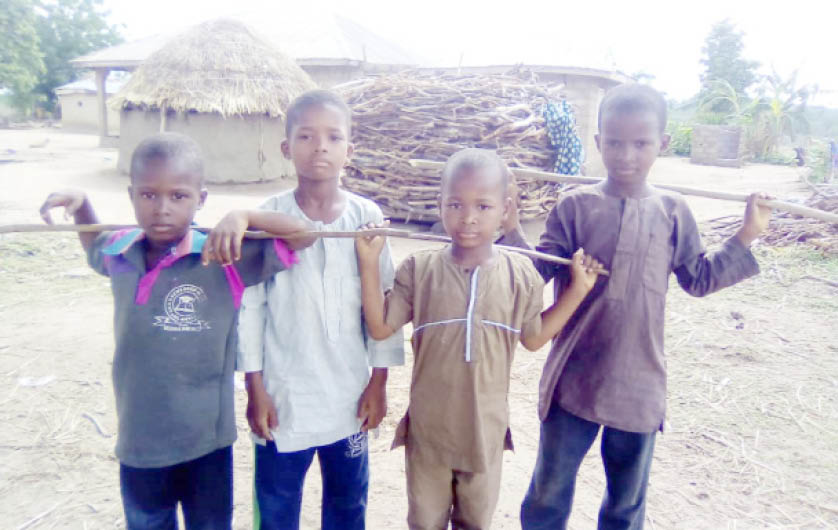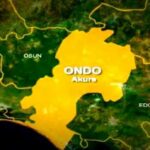Thousands of nomadic children in Oyo State are currently out of school as a result of farmers/herders clashes, which resulted in the eviction of Fulani in some parts of the state, Daily Trust can report.
Farmers/herders clashes have been a long-standing security issue in Nigeria. This situation has also affected thousands of children in various communities, including those in Ibarapa North LGA of Oyo State.
- Bandits set security base ablaze, impound military vehicle in Niger
- Kano APC: Ganduje, Shekarau meet Buni, set to resolve crisis
Findings by our correspondent revealed that in Ibarapa North Local Government Area, no fewer than 22 nomadic schools have been closed down leaving thousands of children roaming idly on the street.
The 22 schools are spread across the three towns in the local government, comprising Ayete, Tapa and Igangan.
Igangan is the town where the Sarkin Fulani of Oyo State and his family were evicted last year after a one-week ultimatum given by the Yoruba nation agitator, Sunday Adeyemo, popularly known as Sunday Igboho.
The eviction of Fulani residents in Igangan was the climax of the age-long farmers/herders confrontation, which triggered suspicion among the Fulani and Yoruba residents.
One of the aftermaths of the eviction was the disruption of the education of thousands of nomadic children, who are now stranded owing to the closure of 22 schools in Ibarapa North.
Our correspondent who was in Ibarapa North Local Government Education Authority office also learnt that no fewer than 65 teachers of the 22 nomadic schools are currently awaiting new posting from the State Universal Basic Education Board (SUBEB).
Daily Trust Saturday was informed that the SUBEB office in the local government had notified the state of the development and now awaiting responses on the status of the schools.

A SUBEB official who spoke with our correspondent on the condition of anonymity because he was not authorised to speak to the press said, “We wrote to the State Universal Basic Education Board immediately the schools were closed down, and details of the affected schools were sent to Ibadan. I can tell you that all the details are with the Board in Ibadan.
“We also compiled the list of teachers affected and sent to SUBEB so that they can be repositioned and not be idle since the state is still paying their salaries.”
It was learnt that in the heat of the crisis, virtually all the community schools in that local government, including those that are not nomadic, were closed down. But a few weeks later, those attended by indigenes (the Yoruba) were reopened while 22 nomadic schools remain closed.
It was further learnt that few of the Yoruba pupils in the nomadic schools had been relocated to other community schools on the request of their parents.
Though our correspondent could not estimate the number of nomadic children affected, it was estimated that up to 150 pupils are in each of the schools.
Another local government education official said, “We have sought the intervention of the SUBEB in terms of what can be done for things to come back to normalcy.
“Those who are natives in some of those schools have been relocated. However, in schools where the pupils are predominantly Fulani, it was not possible to relocate or reposition the pupils.
“As I am talking to you, teachers still go to some of the 22 schools where tension has reduced, but none of the children would be there as they have stopped going. We are waiting for the state to relocate the 65 teachers if the schools are not going to reopen any time soon.”
According to the National Commission for Nomadic Education, out of the estimated population of 9.4million nomads in Nigeria, 3.3 million are children of school age.
Since 1989 when the commission was established, efforts have been made to bring the children of the nomads into the formal education net.
However, the rising tension among pastoralists and their host communities has disrupted the system, making it difficult for the goal of integrating nomadic children into the formal education system difficult.
A visit to Nomadic Primary School, Gaa Seriki in Igangan, showed that the two-classroom structure, which was razed down by rampaging youths during the Sunday Igboho invasion remains deserted. All the children of the school were displaced as soon as Fulani herders were evicted from the settlement.
The majority of them relocated to Ilorin at the time of the crisis, but at the moment, the pupils are out of school. Even as the world celebrates the International Day of Education this week, the nomads’ fundamental right to education has been under serial attacks, requiring concerted efforts on the parts of various governments to reassert.
Our correspondent was directed to Gaa Budo Otu (Budo Otu settlement) in the Asa Local Government Area of Kwara State, where some of the displaced Fulani children were said to have relocated with their parents. They now help their parents in grazing their cattle and are presently unsure of when to return to school.
At the settlement, Daily Trust Saturday met Amadu Aliu, Umaru Adamu, Usman Demo and Teslim Saliu, who said through an interpreter that they were still willing to go to school.
Huraira Saajo and Mufashiru Isa, who attend Nomadic Basic School, Kajola, also expressed willingness to go back to school if there is an opportunity for them. They attend an Islamiyya school at the settlement.
Ibrahim Saliu, who attended one of the nomadic schools in Igangan, lamented that the education system had been bastardised as a result of the rising farmers-herders tension.
“I and my siblings attended the school in Igangan. Nomadic education has really helped a lot of Fulani kids. In Igbo Ora, nomadic schools have produced a lot of graduates who are doing well today. There were quite a number of natives who also attended the nomadic schools, but the recent crises have destroyed everything. A lot of our kinsmen are still willing to go back to school. We only hope the government would do something about it,” he said.
Speaking with our correspondent, the evicted Sarkin Fulani, Alhaji Saliu Abdulkadir, recalled how he facilitated the establishment of nomadic schools in Oyo and Ede, but lamented that most of the nomadic schools are no longer functional.
He said, “In the whole of Oyo State, I was the first person to facilitate the establishment of nomadic schools. At that time, Ede was part of Oyo State. It is sad that nomadic schools are virtually dead now.”
Reaction from SUBEB
The State Universal Basic Education Board, under the chairmanship of Dr Nureni Adeniran, has been briefed about the status of the nomadic schools in Ibarapa North. However, efforts to get a reaction from the Board were unsuccessful as at the time of filing this report.
Adeniran told our correspondent on the phone that he was in Abuja.
Educationist decries destruction of nomadic education
An educationist, Mr Lamidi Alabi said nomadic education was a laudable initiative to actualise the “Every Child Counts” policy of the government to reduce the number of out-school-children.
Alabi, who was a permanent secretary in the Ministry of Education in Kwara State said, “It is not only the education sector, other sectors of the economy have suffered from insecurity in the country.
”The problem has to be approached proactively and holistically. If there’s a continued threat to various locations, including Fulani settlements, there is no way children can settle down. They can only learn where there is an atmosphere of peace and security. So we have to guarantee peace first; we have to address insecurity before you can think of reactivating the nomadic system of education.
“Definitely, it is a good one. It would make education go round because every child is important. It is an issue. There’s no way you can approach education without talking about security challenge. They dovetail into each other. “

 Join Daily Trust WhatsApp Community For Quick Access To News and Happenings Around You.
Join Daily Trust WhatsApp Community For Quick Access To News and Happenings Around You.


